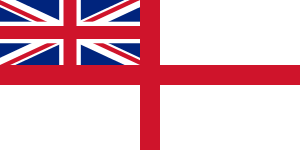Navy Board
|
Flag of the Navy Board | |
| Agency overview | |
|---|---|
| Formed | Modern authority, 1964 |
| Jurisdiction |
|
| Headquarters | Whitehall, London |
| Agency executive | Admiral George Zambellas, (First Sea Lord) |
| Parent agency | Ministry of Defence |
The Navy Board is today the body responsible for the day-to-day running of the British Royal Navy.[1] Its composition is identical to that of the Admiralty Board of the Defence Council of the United Kingdom, except that it does not include any of Her Majesty's Ministers.[2]
From 1546 to 1831, the Navy Board was also the name of a body separate from the Admiralty, originally called Council of the Marine and presided over by the Lieutenant of the Admiralty, which was responsible for the administrative affairs of the naval service, including the building and repair of and supplies to naval ships.[3] In doing so, they ran the six major naval dockyards in England, Deptford, Woolwich, Chatham, Sheerness, Portsmouth and Plymouth, as well as smaller operations elsewhere. However their armament was the responsibility of an independent body, the Board of Ordnance.
In the 18th century, the Navy Board had subsidiary organisations such as the Sick and Hurt Commissioners (responsible for naval medical services) and the Victualling Commissioners (responsible for food supplies).
Contractors
While the Navy Board operated the dockyards, it depended on a network of suppliers for many of the commodities needed for building and repairing ships.
Ironware
Most ironware was provided by contractors, but there were also smiths employed in each dockyard. Shortly after the English Restoration, Robert Foley obtained a contract from the Navy Board to supply ironware to several dockyards.[4] His son Robert Foley II succeeded him in this contract, but was replaced by Ambrose Crowley, whose family retained the contract for all the dockyards except Portsmouth until the 1780s.[5]
References
- ↑ About the Royal Navy: Navy Board
- ↑ ROYAL NAVY COMMAND AND ORGANISATION: HIGHER MANAGEMENT OF THE ROYAL NAVY
- ↑ PORTSMOUTH ROYAL DOCKYARD HISTORICAL TRUST: BEFORE THE DAWN – EARLY ORIGINS
- ↑ M. B. Rowlands, Masters and Men in the West Midlands metalware trades before the industrial revolution (Manchester University Press, 1975), 87-92.
- ↑ M. W. Flinn, Men of Iron: the Crowleys in the early iron industry (Edinburgh University Press 1962), 44-5; The National Archives, ADM 49/120-121, passim.
| |||||||||||||||||||||||||||||||||||||||||||
| ||||||||||||||||||||||||||||||||||||||||||||

